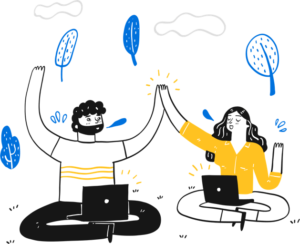Flow in Learning
September 5, 2021 2022-09-14 12:20Flow in Learning
Flow is a concept largely credited to psychologist, Mihaly Csikszentmihaly. It refers to a psychological state of mind where one is completely engrossed in a task. It is a phase of intense concentration, where nothing else matters. When in flow, people have reported feeling increased satisfaction, increased productivity and a heightened sense of accomplishment. Instances of flow are perceived as sudden moments that come and go unannounced. However, Csikszentmihaly and other researchers identified a few variables that could convert regular day-to-day activities into a flow producing experience.
The question for all of us in the learning space, is how, if at all, can we make online learning a flow producing experience?
One promising learning methodology, the use of simulations, may be the answer. Simulations are short, real-world narratives in a fictional, virtual environment. Here, learners step into the shoes of a character, make decisions for them and experience the consequences of those decisions, all the while learning new skills and solving practical challenges.
There are 5 key factors which contribute to creating a flow producing experience.
Focus
The first factor is a high level of focus or intense concentration. Simulations can increase levels of focus by having a captivating and engaging storyline. It is important for learners to feel for the characters and their problems. By having learning embedded in a story, learners are able to look at a situation more holistically (much as they would do in real life), rather than focusing on stand-alone skills. This results in them feeling more involved, bringing about a higher level of focus. Remember, it is not necessary for the story or situation to replicate what happens in a certain industry, company or role. What is important is that the decision points are sensible and logical, given the information in hand and that the reactions, emotions and behaviours of the characters are what one would naturally expect in that particular situation.
Quick and immediate feedback
In order to attain flow, it is crucial for individuals to receive quick and immediate feedback about their performance. Simulations can do so by showing learners the consequences of their actions and indicating why certain decisions may be better than others. Keep in mind, in order to be effective, feedback needs to be provided on why a particular decision may or may not work in a given situation, and not merely on whether it is correct or incorrect.
Freedom to make mistakes
An important but often overlooked factor is the freedom to make mistakes. The less that individuals are invested in self-scrutiny, the more likely they are to achieve a state of flow. For simulations to effectively utilize this factor, it is crucial that learners feel safe making mistakes. This involves avoiding large red screens that say WRONG or ending the simulation as soon as a mistake is made. Even in a gamified environment, aspects like these may make learners feel guilty, or sometimes, incompetent about choosing an incorrect option.
Simulations must be built in such a way for the learners to experience the consequences of their incorrect decisions and try again until they make the best choice in the given situation. This freedom to make mistakes enables learners to feel more involved in the story, increasing the chances of attaining flow.
Measurable progress
To stay in a state of flow, individuals must feel like they are moving closer and closer to their eventual goal. This implies two things. The first, that the goal is clear and the second, that they can track their progress against the goal at all points of time. This, combined with quick and immediate feedback, allows individuals to feel the heightened sense of accomplishment usually associated with being in flow.
In the learning context, in order to measure progress, it is important for learners to first be clear on the objectives of the simulation. An initial context setting screen, explaining what needs to be done and why, goes a long way in clarifying the goal. This context setting must not only be about the problems that need to be solved but also in the skills that must be used to solve them. This gives learners a clear idea on what they will be learning through the simulation.
As they progress through the story, making different decisions, it is important to highlight how close they are to achieving the goal and all the skills that they have picked up along the way.
Optimal challenge
The final factor in creating an experience of flow is a creating an optimal balance of challenge and individual skill. If a task is too challenging for an individual, given their skill level, it leads to anxiety. If a task is too easy, it leads to boredom. An ideal task is one which is just out of reach, so that an individual knows they can achieve it if they try hard enough. It gives them something to work towards – a reason to push themselves.
One of the ways to do this in a simulation is to give learners more control. Imagine a simulation that has hints available should the learner choose to use it. It could have learning resources like videos and infographics readily accessible if the learner feels like they need it to solve the problems at hand. Essentially, you are letting the learner choose just how much information they want to use to make the simulation optimally challenging for themselves. This way learners with a higher skill don’t lose interest by being forced to go through introductory, explainer videos and those with lower skill levels do not get nervous or anxious about going through the simulation without the guidance they require.
Flow in practice: Insights from our learners
- Most learners played at
least 3 games in one single sitting
- About 180 learners
played all 70 available games in a 2 week period
- Over 900 learners chose
to reattempt a game to get a better score, with many learners playing a
single game over 10 times (some even played a single game 100 times!)
Resources:
Flow by Mihaly Csikszentmihaly
The Four Fs of Flow (https://www.youtube.com/watch?v=DXD8QjpQrFc)
Related Posts
The choices we must make | How multiple choice simulations help us learn
Experience Flogames
Search
Latest Posts









